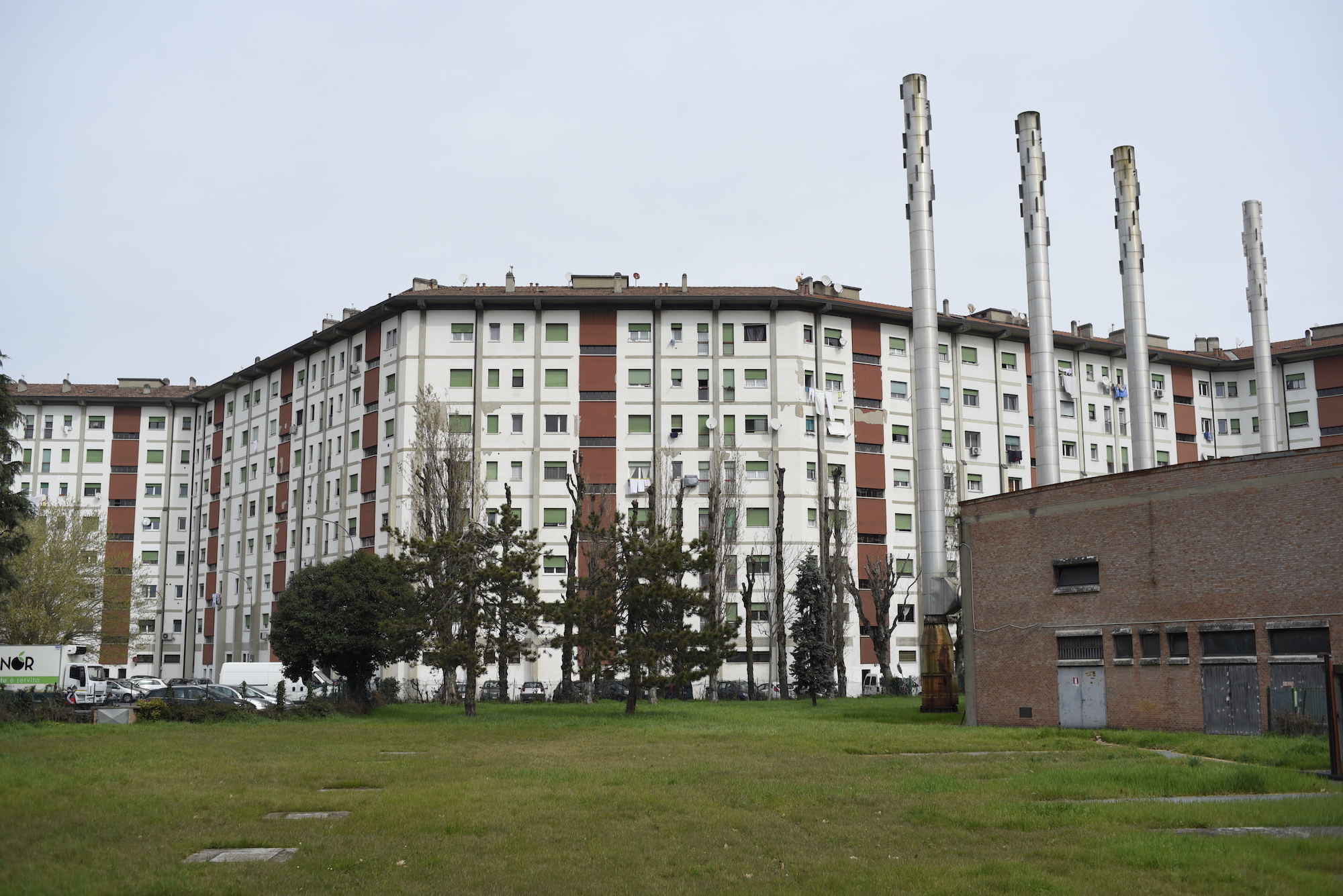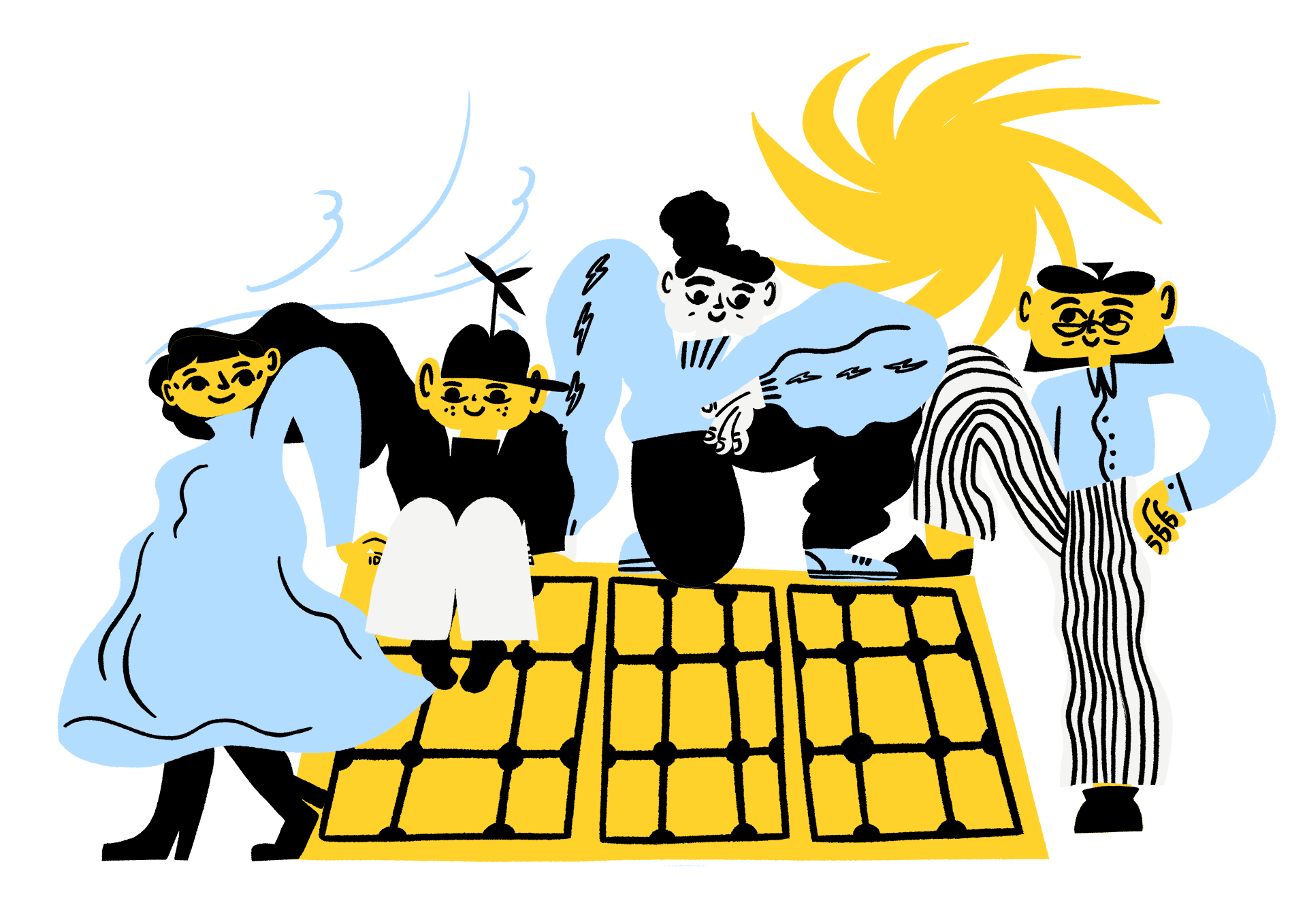The case study takes place in the Pilastro-Roveri district in the northeast of Bologna, where a financed Green Energy Community project (GECO) has been running since 2019 to support communities in the process of designing and creating a green energy community. Pilastro-Roveri is a socio-economically stratified district composed of two areas:
Pilastro “Rione” (neighbourhood): a residential neighborhood with a long history of activism but also of socio-economic issues.
Roveri area: distinctly separated from Pilastro by a former railway terminal, is an industrial and productive neighborhood hosting a variety of companies in sectors such as packaging, mechanics, and electric vehicles. The area also hosts the Agriculture and Food Center of Bologna’s (CAAB) food and agriculture theme park (FICO) with its industrial partners, which has the largest solar power plant on industrial roofs within the EU.
Civic activism can be a trigger for energy community creation
The Pilastro “Rione” is composed by a high percentage of social housing and low-rent apartment, and few flats owned by the inhabitants. The area has a high percentage of elderly and immigrant residents, but also of teenagers and families. Its population is mostly unaware of questions related to energy, and can have a limited understanding of technical subjects. In addition, a tendency towards competition, privatism and NYMBYs phenomena may hinder the participation of entrepreneurs and companies, especially in the Roveri area, decreasing institutional trust and increasing conflicts in the management of buildings and their maintenance, exacerbated by diversified properties.
However, the area hosts a high percentage of associations, committees and groups of active citizens who for decades have been working with the local community on many issues. The same attitude has not yet been seen in Roveri, where only a few experiences of community engagement have occurred. Although the experiences are small, they are important. The area also shows potential in renewable energy features and opportunities for production and storage.
Testing strategies to combat injustice and exclusion in the energy transition
Due to its geographical, functional, and social nature, the Pilastro-Roveri case study provides grounds for testing strategies for combating injustice and exclusion in the energy transition by, for example, enabling better understanding, use and sharing of energy data, and tailoring of place-based solutions for the specific areas.
In the case study, we identified and described the attitude of the community towards energy behaviors through a series of incremental activities, such as collective urban district treks, monthly roundtables with local associations, and participant observation in local neighborhoods.
By establishing mechanisms of engagement via the existing GECO community, participating in the associations’ monthly meetings, triggering collaboration among companies and agreements between property owners and tenants, we aimed to support the community to an active engagement level where aware, involved citizens take decisive action towards energy goals and at the same time create alternative governance mechanisms. The case study was led by the University of Bologna.
Our findings and conclusions
The findings highlight the difficulty of involving the citizens of the neighbourhood, above all due to the strong socio-economic emergency since those who find themselves in conditions of poverty or social fragility do not consider the energy issue as a priority. Critical points related to the communities of the two areas can be summarised as:
- Pilastro community is experiencing a certain fatigue since the area and its citizens are often subject to large top-down projects that, when they terminate, leave the area with no benefits or added value. The community is very aware both of their stigmatisation and of their potentiality, but they fear to be exploited only for external purposes. On a positive note, the population is interested in the energy topic and in some case expresses the will to learn more, to share their knowledge and to get more attention from institutions such as the University, requiring a more stable presence in the area.
- Roveri community is composed of transient inhabitants, city users who stay in the area only for a limited hours per day. They tend to not recognise themselves as belonging to a community, but are very much engaged in energy topics and committed to improve their behaviours.
With respect to enabling methods and how to support an increase in awareness and an increase in energy efficient actions, knowledge and information appear to be key. The need to shared listening is highlighted not so much to arrive at a common position but to understand different positions and the reasons why one is not interested in that issue. These appear crucial but prove to be more effective if combined with an effective return and economic benefit.
Indeed, incentives, especially economic ones, are seen as a key tool that can support the actions of parts of the population that would otherwise find it difficult to access them. From the table discussion it emerged that this is actually a primary need, since different groups of citizens would be ready to invest in energy efficient actions, but need economic support when these involve the installation and/or purchase of tools and materials.
Finally, it emerges how these aspects must be supported by real activities of constant accompaniment of the community in its actions, not only at the start of the initiatives but over time.

